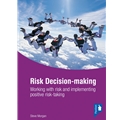How good must the book be?
 Tuesday, March 13, 2018 at 3:47PM
Tuesday, March 13, 2018 at 3:47PM Sign up for a series of emails containing access to a range of FREE checklists, tools and YouTube videos, offered to help you further develop your knowledge and practice in working with a person-centred strengths-based perspective...
https://positiverisktaking.lpages.co/working-with-strengths-2/
People are naturally suspicious of material given away for free... is it any good, what is the catch? The answer to those two questions is Yes & No respectively.
These are materials I have been aware of, developed and used since the early 1990's, and now I am getting into the autumn of my career (as much as I would like to think of 60 as being spring!), I would like a much wider range of people to become aware of, and make good use of them.
So, whether you think you know it all already, or you are always open to continual learning and reflection, why not check out the link? What have you got to lose, other than a few minutes of your precious time when my occasional informative emails arrive in your inbox? I promise I don't do spam.
https://positiverisktaking.lpages.co/working-with-strengths-2/
If the free stuff is that good, I wonder how good the book must be?






